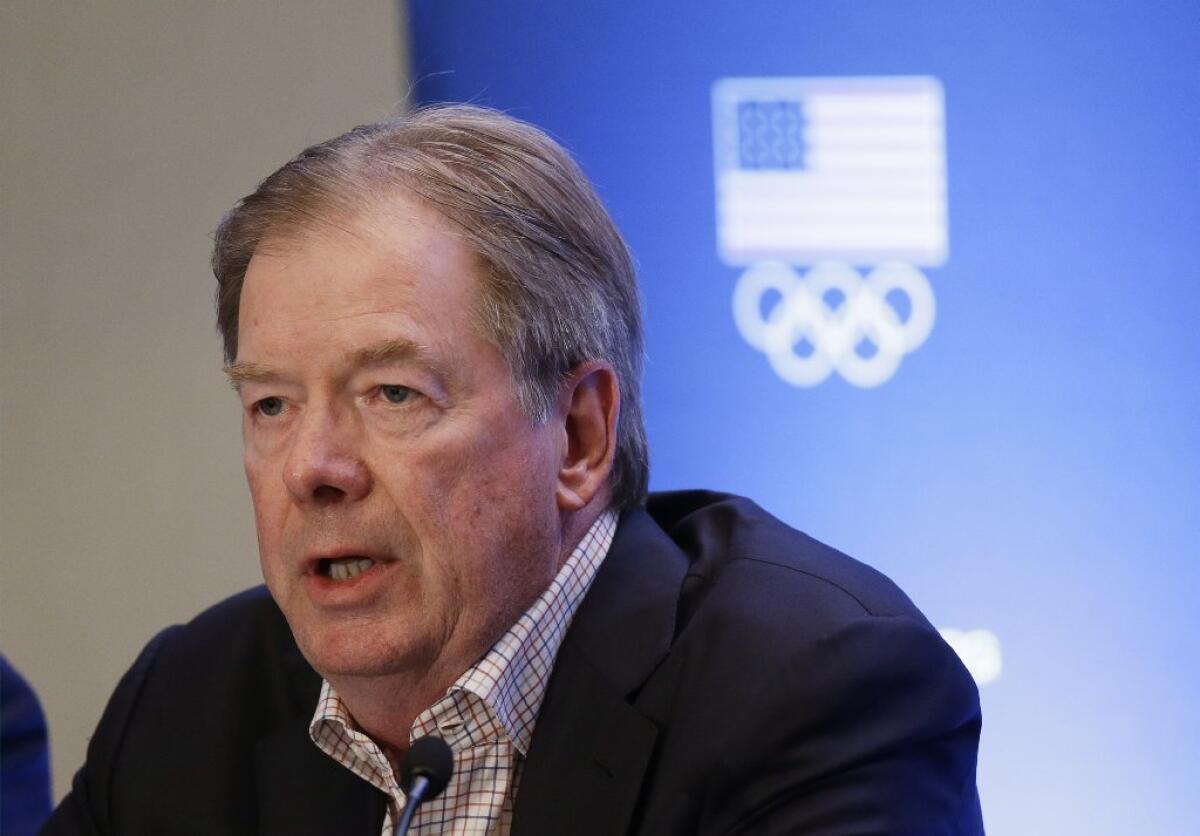U.S. Olympic Committee sticks with Boston’s troubled 2024 bid

U.S. Olympic Comittee Chairman Larry Probst speaks during a news conference Tuesday after meeting to discuss the Boston 2024 Olympic bid.
- Share via
REPORTING FROM REDWOOD CITY, Calif. — The U.S. Olympic Committee emerged from a lengthy session here Tuesday with a mixed message for Boston and its embattled 2024 Olympic bid.
USOC board members pledged to stand behind the city they chose over Los Angeles in a close vote last winter. But they also voiced concerns about lagging public support.
A recent poll showed only 39% of Massachusetts residents favor hosting the Summer Games in their capital.
“None of us are happy with the current numbers,” USOC Chairman Larry Probst said, adding: “We obviously want to see a positive trend, and the sooner the better.”
Stopping short of a specific deadline, Probst called for Boston to increase support to 50% “relatively soon” — bids must be submitted to the International Olympic Committee in mid-September — and continue above 60% thereafter.
The warning held particular significance for Los Angeles, which could step in as a last-minute replacement, said individuals close to the situation who were not authorized to speak publicly.
“We all agree that we hope to see positive movement,” said Steve Pagliuca, chairman of Boston 2024.
The bid committee has taken a number of steps to revive its campaign in recent weeks, beginning with a leadership change that saw Pagliuca — co-owner of the Boston Celtics — take charge.
By most accounts, the new chairman has been more communicative about his organization’s plans.
This week, the committee released a “2.0 bid” that projects sufficient revenue from ticket sales, sponsorships and other sources to cover $4.6 billion in operating costs and generate a $210-million surplus.
In another significant change, officials have relocated a number of venues outside city limits to communities in the west and south of the state. The recent poll by radio station WBUR showed residents might be more supportive of a Games spread across a wider footprint.
“We’re very confident that the voters and anyone who looks at this will say it’s a sound, prudent plan,” Pagliuca said.
On Tuesday, USOC officials devoted much of their quarterly board meeting to reviewing the proposal’s details.
“The board obviously asked a lot of questions and provided some feedback,” Probst said. “We’re going to circle back and get together in mid-July.”
By then, there should be some indication about whether Boston 2024’s efforts are resonating with a skeptical public.
Opponents were initially unconvinced, especially when it came to worries about staging one of the world’s largest and most costly sporting events.
“The plan contains scant new detail for how Boston 2024 will protect taxpayers from the risk of massive cost overruns that have plagued the Olympics,” a group called No Boston Olympics said in a statement.
Pagliuca said his committee has begun talks with insurance brokers to purchase a $128-million package that would protect against cost overruns. But he also noted: “Nothing in life is risk-free.… I think people will decide the risk is well worth taking.”
For USOC officials, there are numerous concerns, starting with a proposed statewide referendum that would not go to voters until November 2016, more than a year after the IOC’s bid deadline.
American officials have been conducting their own public opinion polls, the results of which they have declined to make public. They continually monitor reactions throughout the Olympic movement.
“Without question, the IOC members pay attention,” Probst said. “Whenever we have the opportunity to interact … we’re having those discussions.”
In the meantime, USOC Chief Executive Scott Blackmun sought to quell speculation about pulling the plug on Boston.
His organization has not talked to Los Angeles or the other two finalists from last winter — San Francisco and Washington, D.C. — about stepping in as a replacement, he said. Skipping the 2024 bid cycle altogether did not seem to be an option at this time.
“We’re focused exclusively on Boston,” he said. “Boston is our partner.”
Follow David Wharton on Twitter @LATimesWharton
More to Read
Go beyond the scoreboard
Get the latest on L.A.'s teams in the daily Sports Report newsletter.
You may occasionally receive promotional content from the Los Angeles Times.











